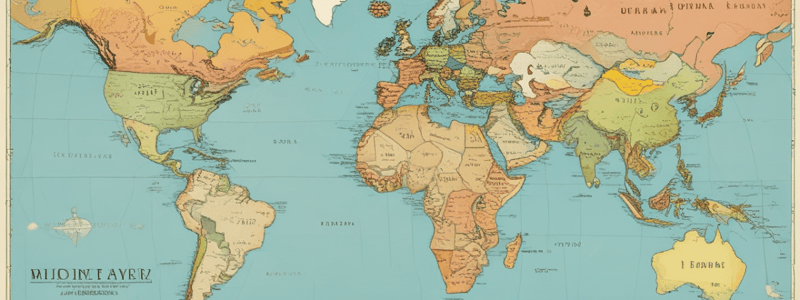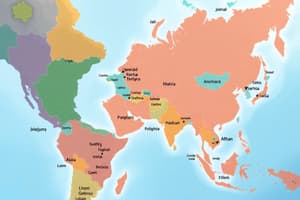Podcast
Questions and Answers
Which country has no official language at the federal level?
Which country has no official language at the federal level?
- Brazil
- India
- United States (correct)
- Canada
Which of the following countries recognizes multiple official languages?
Which of the following countries recognizes multiple official languages?
- Germany
- South Africa (correct)
- Japan
- China
What is the official language of Brazil?
What is the official language of Brazil?
- Spanish
- Portuguese (correct)
- French
- English
In which country is Arabic recognized as the official language?
In which country is Arabic recognized as the official language?
What is the main difference between de facto and de jure languages?
What is the main difference between de facto and de jure languages?
Which language is NOT one of the official languages of Switzerland?
Which language is NOT one of the official languages of Switzerland?
Which of the following is an official language of Canada?
Which of the following is an official language of Canada?
Which country has Hindi and English as official languages?
Which country has Hindi and English as official languages?
What is the primary language spoken in Australia?
What is the primary language spoken in Australia?
What is the official language of Japan?
What is the official language of Japan?
What is the official language of Nigeria?
What is the official language of Nigeria?
What is the official language of Egypt?
What is the official language of Egypt?
What is the official language of Finland?
What is the official language of Finland?
What is the official language of Brazil?
What is the official language of Brazil?
Flashcards are hidden until you start studying
Study Notes
Countries and Their Official Languages
-
United States
- No official language at the federal level; English is the de facto language.
-
Canada
- Official languages: English and French.
-
United Kingdom
- Official language: English; Welsh is also official in Wales.
-
Australia
- No official language; English is the primary language spoken.
-
India
- Official languages: Hindi and English; regional languages recognized.
-
China
- Official language: Mandarin Chinese (Putonghua).
-
Brazil
- Official language: Portuguese.
-
Mexico
- No official language; Spanish is the most widely spoken.
-
Russia
- Official language: Russian; regional languages recognized.
-
Germany
- Official language: German.
-
France
- Official language: French.
-
Japan
- Official language: Japanese.
-
Italy
- Official language: Italian.
-
South Africa
- 11 official languages including English, Afrikaans, isiZulu, isiXhosa.
-
Switzerland
- Four official languages: German, French, Italian, Romansh.
-
Spain
- Official language: Spanish (Castilian); regional languages like Catalan, Galician, and Basque have co-official status in their regions.
-
Arab League States
- Official language: Arabic.
-
Indonesia
- Official language: Indonesian (Bahasa Indonesia).
-
Argentina
- Official language: Spanish.
Notes on Official Language Status
-
De Facto vs. De Jure:
- De facto languages are widely spoken but not legally recognized; de jure languages are legally established as official.
-
Multilingual Countries:
- Many countries have multiple official languages reflecting cultural and regional diversity.
-
Legal Recognition:
- Some countries have laws that protect minority languages, allowing them the status of co-official languages in certain regions.
-
Language and Identity:
- In many nations, official languages are tied to national identity, history, and culture.
Interesting Facts
- Some countries have no official language but have a primary language that dominates (e.g., United States, Australia).
- The number of official languages can be a reflection of the country’s ethnic diversity and colonial history.
Countries and Their Official Languages
- United States: No federal official language; English serves as the de facto language.
- Canada: Bilingual nation with English and French as official languages.
- United Kingdom: English is the official language; Welsh is official in Wales.
- Australia: No formal official language; English is predominantly spoken.
- India: Hindi and English are official; various regional languages are recognized.
- China: Mandarin Chinese (Putonghua) is the official language.
- Brazil: Portuguese is the sole official language.
- Mexico: Spanish is the primary language; no official language established.
- Russia: Russian is the official language, with regional languages having recognition.
- Germany: German is the official language.
- France: French is the designated official language.
- Japan: The official language is Japanese.
- Italy: Italian is recognized as the official language.
- South Africa: Has 11 official languages, including English and Afrikaans, reflecting its cultural diversity.
- Switzerland: Has four official languages: German, French, Italian, and Romansh.
- Spain: Spanish (Castilian) is the official language; regional languages hold co-official status.
- Arab League States: Arabic is the official language in member states.
- Indonesia: The official language is Indonesian (Bahasa Indonesia).
- Argentina: Spanish is the official language.
Notes on Official Language Status
- De Facto vs. De Jure: De facto languages are prevalent but not legally recognized; de jure languages are officially sanctioned by law.
- Multilingual Countries: Many nations exhibit multilingualism, showcasing their cultural and regional diversity.
- Legal Recognition: Some countries legally protect minority languages, allowing co-official status in specific areas.
- Language and Identity: Official languages often embody a nation’s identity, culture, and historical context.
Interesting Facts
- Numerous countries lack an official language despite having a dominant spoken language (e.g., United States, Australia).
- The variety of official languages in a country often reflects its ethnic diversity and colonial past.
Countries and Their Official Languages
- United States has no federal official language; English serves as the de facto language.
- Canada recognizes both English and French as official languages.
- United Kingdom's official language is English; Welsh holds official status in Wales.
- Australia lacks an official language, with English being the primary spoken language.
- India has Hindi and English as official languages, along with recognition for regional languages.
- China's sole official language is Mandarin Chinese (Putonghua).
- Brazil's official language is Portuguese.
- Mexico does not have an official language, but Spanish is predominant.
- Russia's official language is Russian, with various regional languages being recognized.
- Germany's official language is German.
- France recognizes French as its official language.
- Japan's official language is Japanese.
- Italy's official language is Italian.
- South Africa boasts 11 official languages, including English, Afrikaans, isiZulu, and isiXhosa.
- Switzerland features four official languages: German, French, Italian, and Romansh.
- Spain officially recognizes Spanish (Castilian), with regional languages like Catalan, Galician, and Basque holding co-official status in their areas.
- Arab League states have Arabic as their official language.
- Indonesia's official language is Indonesian (Bahasa Indonesia).
- Argentina designates Spanish as its official language.
Notes on Official Language Status
- De facto languages are common but not legally recognized, whereas de jure languages are formally established as official.
- Several countries exhibit multilingualism, showcasing cultural and regional diversity through multiple official languages.
- Laws exist in some nations to protect minority languages, granting them co-official status in specific regions.
- Official languages often connect to national identity, historical backgrounds, and cultural elements in various countries.
Studying That Suits You
Use AI to generate personalized quizzes and flashcards to suit your learning preferences.




